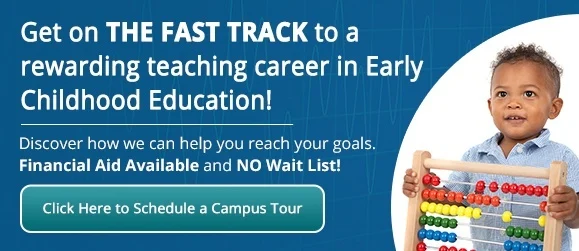Exploring the Different Career Paths for Early Childhood Education Graduates
Posted On May 12,2023
If you are considering a career change and looking into how to become a preschool teacher, you will find that you need a degree in early childhood education. Once you begin your program, you will learn there are actually many other career paths available to you beyond the classroom after you graduate.

A Preschool Teacher with an Early Childhood Degree
When people think of early childhood education, their thoughts turn right to teaching in preschool. Becoming a preschool teacher will set you on the path toward a fulfilling career. Preschool teachers can work in public or private education and teach young children through hands-on activities and play. Many days involve games, music, art, books, and imaginative play. Preschool teachers work on helping young students build fine motor skills, gross motor skills, social and emotional skills, and early academic skills. Your early childhood education program will cover the different ways children grow, learn, and form relationships. You will understand physical, emotional, social, and intellectual growth in children from birth through age 5. After completing the program, you’ll need to apply for a teaching certificate.
Become a Child Life Specialist
Child life specialists work with children in families in the healthcare field, not as a medical specialist, but as someone to help them cope with challenges of illness, injury, medical procedures, or hospitalization. A child life specialist uses their early childhood education degree to help prepare children and families for what is to come, explaining things at an age appropriate level, and helping to provide support to family members.

An Early Childhood Education Can Allow You to Become an Infant Teacher
Infant teachers may not work in what we traditionally think of as an educational setting, but certified early childhood educators know that there is a real role for teachers focusing on children younger than 3. Infant teachers help provide an educationally rich environment in childcare settings and use developmentally appropriate activities throughout the day to foster growth in the youngest of students.
Early Intervention Specialist
You can pursue work within the field of special education as an early intervention specialist. These professionals work with children from birth to age 4 to identify and address developmental delays. Some early intervention specialists work in preschools, others with developmental physicians, and others in regional programs. By addressing any developmental delays and difficulties early on, children have a much higher rate of success later on in life.
Finding the Right Career Path in Early Childhood Education
As you work through your program and earn a degree in early childhood education, don’t immediately decide on your path. Instead, think about the different skills you are learning and beginning to demonstrate. All early childhood educators must be patient, creative, adaptable, energetic, empathetic, organized, and have strong communication skills. However, you may find that you really enjoy exploring the development of babies and toddlers, which would lead you toward a career as an infant teacher. Or you may find that you have a high aptitude for helping young children who are struggling emotionally or developmentally, which may lead you toward a career relevant to that.
When you are ready to launch your career in working with young children, look for a strong early childhood education degree program that can prepare you for any role. There are so many opportunities to work with young children professionally, and finding the right program is the best place to start. To learn more about how we can help you on your path to earning a degree in early childhood education, contact Athena Career Academy to schedule a campus tour and meet our admissions team.